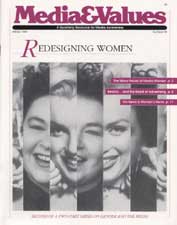GLOBAL: War Against Media Sexism is Global
|
This article originally appeared in Issue# 49
|
A recent gathering of communicators from over 80 countries at the first international congress of the World Association for Christian Comunication in Manila, Philippines provided an opportunity for Media&Values to learn first-hand what media issues women face in other countries and what they are doing about them.
A field trip one day to the MediaWatch Collective provided an opportunity to meet with both peasant women and city women who came together following a comprehensive 1985 project to monitor the images of Philippine women in radio and television shows and commercials, newspapers, women's magazines, popular komics and Tagalog movies.Like their sisters around the world, the Philippine women could document rampant sexism, stereotyping and exploitation in all the media surveyed, e.g
- In advertising women seem to compete endlessly for a whiter wash or softer skin simply to win a man's approving glance. Ninety-two out of ninety-six TV ads were endorsed by male voice-overs, even for cosmetics and toiletries.
- Over 50 percent of the radio ads featured women in their role as mothers; 20 percent were wives; 15 percent, domestics. The overall impression from commercials and ads is that women should be the epitome of beauty, docility and household efficiency. Singer sewing machine advertises: "So dependable, so like Mom!"
- Bold, steamy komics, peddled by young boys for only a few pesos each, are read each week by an estimated 18 million. Plots typically revolve around women as virgins or vamps - kidnapped, helpless or emotionally distressed.
Formally launched in 1987, the collective runs media awareness seminars and circulates a slide/tape show illustrating sexist images and product promotions. It issues an excellent monthly newsletter analyzing ads, movies and TV shows and has lobbied for legislation requiring Filipinization of the advertising industry and a ban on foreign-made and sexist ads.
In an afternoon seminar, representatives from Speak, a South African women's magazine described efforts to counteract advertising which reflects and promotes a middle-class western cultural lifestyle despite the fact that the majority of South African women are black working class mothers who work for low wages, face sexual harrassment and the threat of violence daily and live in townships without basic services.
Nevertheless, a visit to even remote rural areas reveals billboards on the roadside and radios in huts blaring out ads. An ad in a magazine aimed at black women promised, "Win a bedroom suite, big kitchen appliances, pretty underwear, perfumes." No computers or motorbikes or a college education– just ways to better fulfill a subservient role: sex, cooking, looking and smelling good.
In Chile, women's groups are organizing to study Mujer TV, a media awareness education program exposing how women are exploited by TV commercials as well as game shows, telenovelas (soap operas), entertainment and news. The groups monitor popular shows and learn ways to "talk back" to the influence of mass media on themselves and on their families.
The message from Manila is heartening: Everywhere, women are working for change. But clearly there's a long, long way to go.



